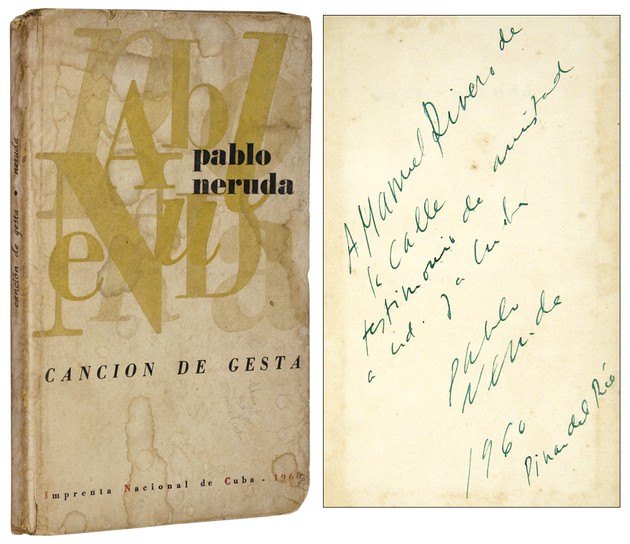
NERUDA, Pablo
Cancion de Gesta (Song of Protest)
(n.p.), Imprenta Nacional de Cuba, 1960. The true first edition of this collection of poems, published in Cuba when Neruda visited the island to celebrate the success of the Communist revolution. Neruda had been radicalized in Spain during the Spanish Civil War, where he had succeeded Gabriela Mistral as the Chilean consul in Madrid. Afterward, in addition to being a poet and diplomat, he became an outspoken supporter of leftist causes; at one point, before the Party was outlawed, he had served in the Chilean Senate as a member of the Communist Party. These poems are focused on oppression and revolution in the Caribbean -- Cuba most especially and Puerto Rico as well -- and elsewhere in Latin America. A coda to the collection is a poem written from the perspective of the year 2000, looking back on the revolutionaries of the Sierra Maestra. On Neruda's visit to Cuba in 1960, when he sought to visit the Cuban countryside, he was accompanied by a young Cuban speleologist, Manuel Rivero de la Calle, as his guide. This copy is inscribed by the author to Rivero de la Calle in the year of publication: "To Manuel Rivero de la Calle, in testimony of friendship to you and to the struggle, Pablo Neruda, 1960, Pinar del Rio (A Manuel Rivero de la Calle, testimonio de amistad a ud. y a lucha)." The recipient later wrote an essay on Neruda as a poet and naturalist, and he went on to become a university professor and one of the most respected anthropologists in the country, an expert on the pre-Columbian art and architecture of Cuba. Mild foxing to pages; multiple dampstains to boards; tiny pencil annotations on cover; a good copy. Becco 152. Not an especially scarce edition: 25,000 copies were published in honor of the great poet's third visit to the island, but a falling out with Fidel Castro, partly on the basis of one of the poems in this collection, led to Neruda's denunciation by Cuban artists and intellectuals in 1966. The book has never been reprinted in Cuba, and despite its being a celebration of the revolution it is reportedly never even mentioned in Cuba, and it is likely that few copies survived there after Neruda was publicly shunned. Very few signed copies of this Cuban first edition have shown up on the market, and this one has particularly interesting provenance, coming from Neruda's young guide to the island at a time when Neruda was one of the most prominent advocates and supporters of the Cuban Revolution in the western world.
[#032666]
SOLD
All books are first printings of first editions or first American editions unless otherwise noted.